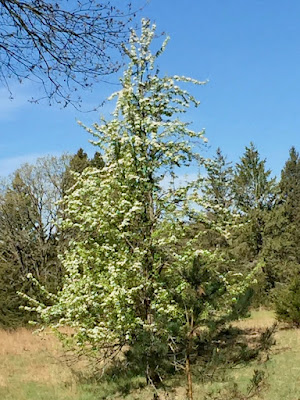Tomorrow, for many, is Beltane, midway between the Vernal Equinox and Summer Solstice, traditionally the beginning of summer or the height of spring. This year, in the north country, it feels like neither. The past winter set records for wettest and snowiest. Spring has followed that pattern. Even our local soil temperature is currently several degrees below our 10 year average. On the bright side, we now know to wait a week or more before spreading this year’s grass seed. Plus, such a delay fits with the guidance we read this morning, to wait until soil temperatures have reached 50℉ or air temperatures have remained above that for almost a week, to be kind to pollinators while managing to avoid killing a lawn. Why didn’t I learn these things in school? Possibly because, when I was in school, such knowledge was less critical than it is these days. Way back then we didn’t know how much trouble pollinators were in.
 |
| coming soon to local woods and roadsides
Photo by J. Harrington
|
Yesterday we captured and killed the first tick of the season. I think one of the dogs collected it and deposited it on my chair, whence I subsequently discovered it walking on my arm. I can catch and release spiders from inside the house, but I won’t catch and release ticks or mosquitos or deer flies or ants, nor am I above using glyphosate on poison ivy. As a redeeming quality, I’m always ready to forego yard chores when the weather is nice and the fish are calling.
Today is the last day of national poetry month for this year. Today’s Star Tribune has a charming and educational piece by Peter M. Leschak, Let us now praise poetry. It nicely complements a similar piece from several years ago about one of Minnesota’s poet laureates, Joyce Sutphen, How poetry can lift us from our troubled times., written by Jennifer Imsande. Minnesota is blessed with a number of poets and a publishing sector to support them. In fact, Minnesota was home to a recent Nobel Laureate in Literature [poetry]. When he lived here his last name was Zimmerman. Other poets live in nearby states and teach in Minnesota. They also help us appreciate where and how we live.
RED WILLOW
Red osier dogwood,
the Indians called
it kinnickinnic,
took inside their lungs
smoke from its bark
mixed with bear
root and tobacco
leaves. Lime-green
during warm months,
a cut branch
can grow new roots
even in sandy soil,
earning red willow
its reputation
for resurrection.
At spring equinox
when the summer
yet to be born
has traveled midway
on its long path
out of darkness,
I drive past fields
still sealed by snow,
where March clouds ruffle
like eaglets' down.
The most vivid color
above or below
is the crimson shine
of kinnickinnic
woven from the smoky
gray ditches.
My winter-
emptied heart
gathers itself,
a willow basket,
to catch that dark
alizarin burnish.
Then I too stand up
out of the scabbed ice
of a dead season,
ready to flower and leaf
again from a bare
red stick.
--from Kinnickinnic, Parallel Press, copyright 2008, Thomas R. Smith
********************************************
Thanks for visiting. Come again when you can.
Please be kind to each other while you can.























